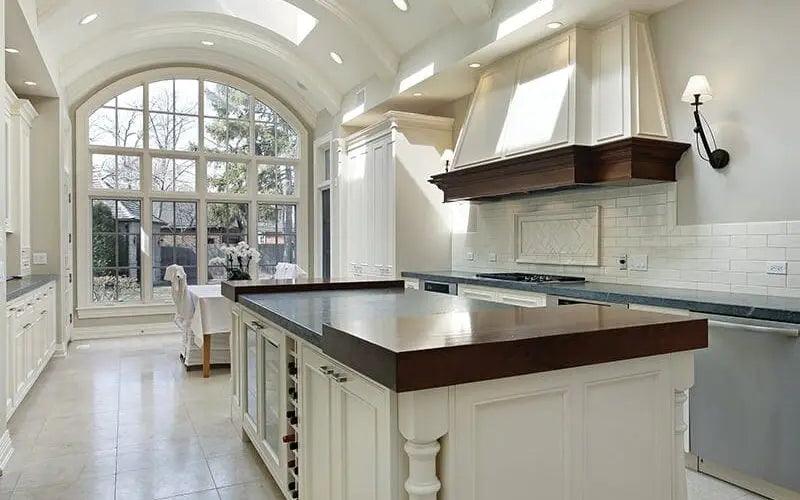Honed Finish on Stone: A Comprehensive Guide
by Shivam Tayal 18 Feb 2025 0 Comments
What is Honed Finish
- The honed finish on stone refers to a surface that has smooth, matt or satin finish without being reflective or polished. This produces a soft and velvety appearance that increases the natural beauty of the stone while conserving the elegance
- Honed stone stone absorbs light which offers a more subtle and organic aesthetic, unlike polished stone which reflects light and creates a mirror-like effect.
- This is achieved by stopping the polishing process before the stone reaches a glossy shine, leaving with a smooth yet non-reflective surface
- This type of finish is celebrated for its versatility and practicality as it highlights the natural patterns, colour and texture of any stone while reducing the visibility of any scratches and marks.
- Its anti-slip nature makes it an optimal choice for bathrooms, pool decks and any other moisture-prone area.
- Regardless of the stone-honed finish make sure that the stone is visually appealing and practically viable
The Science Behind Honed Finish
- The process of honing a stone involves a series of precise mechanical steps that utilise various tools and diamond pads to achieve the required texture and smoothness.
- This begins with the process called rough grinding, where large grit abrasives are used to remove the rough surface of the raw stone, this helps in removing any imperfections and levelling the surface.
- After that, they are replaced with finer grits which makes the surface smoother with each pass
- Then at a particular movement, the process is stopped before the stone reaches a high-gloss shine, this results in a surface that is smooth to touch yet non-reflective
- The level of honing can also be varied on the type of grit used and the intended final result. For example, a stone finished with a lower grit would result in a coarser matt whereas when a higher grit is used it produces a smoother satin-like finish.
- As technology upgrades, manufacturers are able to produce a honed finish with extreme precision and consistency.
- The use of computerised polishing machines and advanced abrasives ensures uniformity across large batches of stone.
- Then certain stones may undergo chemical treatments or sealing processes after honing to increase durability and stain resistance.
Types of Stones Suitable for Honed Finish
- Honed finish is very versatile and can be used on a huge variety of stones each with different characteristics and unique appeal.
- Honed marble is known for its royal appeal and elegant patterns, honed finish brings sophistication to areas such as bathroom countertops, kitchen backsplash and flooring
- Honed granite is known for its exceptional durability and resistance to wear, honed granite is ideal for places like kitchen countertops, outdoor patios and flooring
- Honed Limestone is known for its soft texture and earthy tones thus these look great in areas like fireplaces, gardens and rustic interior designs. However these stones require sealing due to their porous nature.
- Honed travertine is known for its natural pits and distinctive texture which makes them a popular choice for bathroom floors and wall tiles.
- Each type of honed stone is unique and has practical benefits, allowing people to choose according to their specific needs and aesthetic preferences.
Advantages of Honed Finish Stones
- Honed Finish stones offer very distinct advantages which set it apart from other stones
- One of its main benefits is its anti-slip property which makes it optimal for spaces that are frequently exposed to moisture such as bathrooms, kitchens and pool decks.
- The matt texture also helps in reducing glare and creates a calm and cozy ambience in both residential and commercial interiors.
- Honed finish has the ability to hide scratches and everyday wear, making it durable for high foot traffic areas
- Honed surfaces are easy to maintain with regular cleaning and sealing, and they are less prone to water spots and fingerprints, Natural tones and textures of honed stone are available in various stones making it a versatile option for every design needs.
Disadvantages of Honed Finish on Stone
- Honed Stones come with numerous advantages but they also come with certain drawbacks
- One of the biggest disadvantages is its porosity, which makes it more susceptible to staining and moisture absorption when compared to polished surfaces.
- To prevent this regular sealing is essential, particularly in areas exposed to liquid or spills
- Some stones have the potential for colour dullness, Since honed finishes lack the reflective shine of polished surfaces, some vibrant colours or intricate patterns may appear slightly muted, which might not suit every design preference.
- Additionally, while honed finishes hide minor scratches and etch well, they can still be susceptible to surface damage over time, especially in commercial spaces with heavy traffic.




